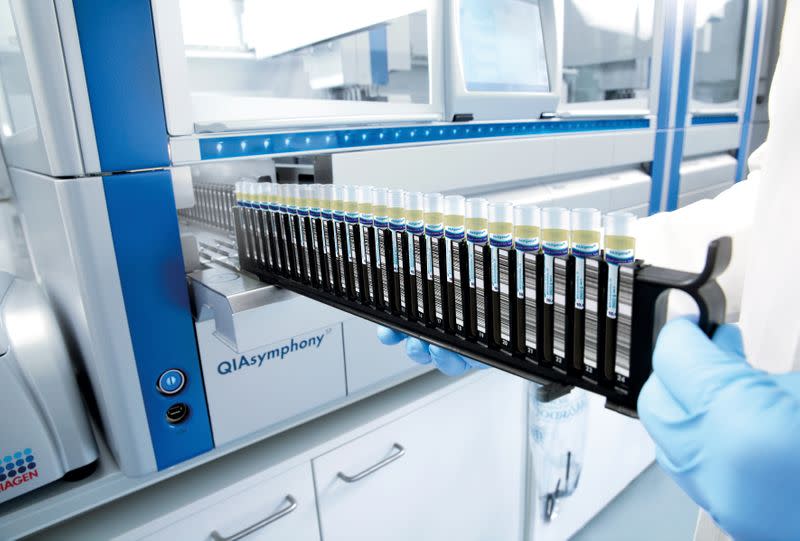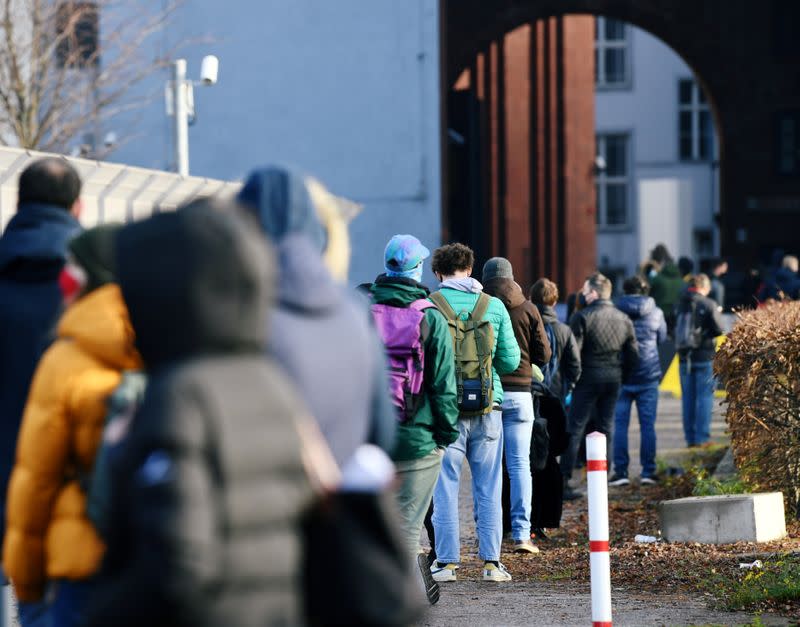Qiagen warns against using standard tests to track coronavirus variants
By Ludwig Burger and Nikolaj Skydsgaard
FRANKFURT/COPENHAGEN (Reuters) - Germany's Qiagen, a leading genetic testing supplier, on Thursday warned against re-engineering standard tests to monitor for new variants of the coronavirus, saying the more onerous decoding of the entire viral genome was the best method.
Scientists believe more contagious variants have fuelled a surge in global coronavirus cases that have exceeded 90 million, and nations are racing to procure vaccines and tighten lockdown measures.
Standard COVID-19 diagnostic kits, called polymerase chain reaction (PCR) tests, scan for a few characteristic genes in the viral genome, while whole genome sequencing, the established procedure to identify new variants, means reading out and analysing the entire genetic code.
Public health systems are eager to track the spread of the new virus types, such as the one that is rampant in Britain, and receive alarms on new ones, exemplified by Germany's bid this week to ramp up genome sequencing.
In principle, it is possible to select a few signature genes of the British variant known as B117 and use them as tell-tale markers of a new PCR test, Qiagen's Chief Medical Officer Davide Manissero told Reuters.
But such a test would miss slightly different but equally contagious versions of B117 that might be circulating, he said, adding that variants are not defined by a clear genetic profile but by how quickly they spread or the symptoms they cause.
"I really think PCR is out of the picture to monitor for variants or even identifying the current UK or South African variants," said Manissero.
Qiagen, which competes in the diagnostics market with Roche, Abbott, Danaher and Thermo Fisher, supplies PCR tests and makes genetic sequencing tools that run on Illumina analytical machines.
Efforts to harness the cheaper and faster PCR technology to keep up with the spread of new variants are underway.
The Danish State Serum Institute told Reuters on Wednesday it had developed a new PCR test to scan specifically for mutated strains.
Danish authorities are prioritising their contact tracing efforts on the mutated variants, in particular to curb B117, which is expected to be the dominant variant in the Nordic country by mid-February.
Contact tracing teams, which help infected people to isolate, no longer have to wait for up to two weeks for the sequencing but can react within 12-24 hours.
But Qiagen's Manissero said such a strategy did not take into account future genetic shifts of the virus that are hard to predict and would not work as a surveillance tool for new virus versions to emerge.
"You’d be aiming at a single variant when maybe there are going to be hundreds of related variants in a year’s time. You wouldn’t know which variant to look for," said Manissero.
"Today it’s the UK (version). In one month it could be a new German variant."Vaccine makers, such as BioNTech, have said so far that their products are likely to be effective for the variants so far identified.
Qiagen said its standard COVID-19 PCR tests have so far shown a positive result for the new variants and the company stress-tests its diagnostic products every two weeks for any changes in the genetic makeup of the SARS-CoV-2 virus that causes COVID-19.
The U.S. drugs regulator said last week new genetic variants of the virus could lead to false negative results from some PCR COVID-19 tests by Thermo Fisher Scientific Inc's and Applied DNA Sciences.
(Editing by Barbara Lewis)

 Yahoo News
Yahoo News 

